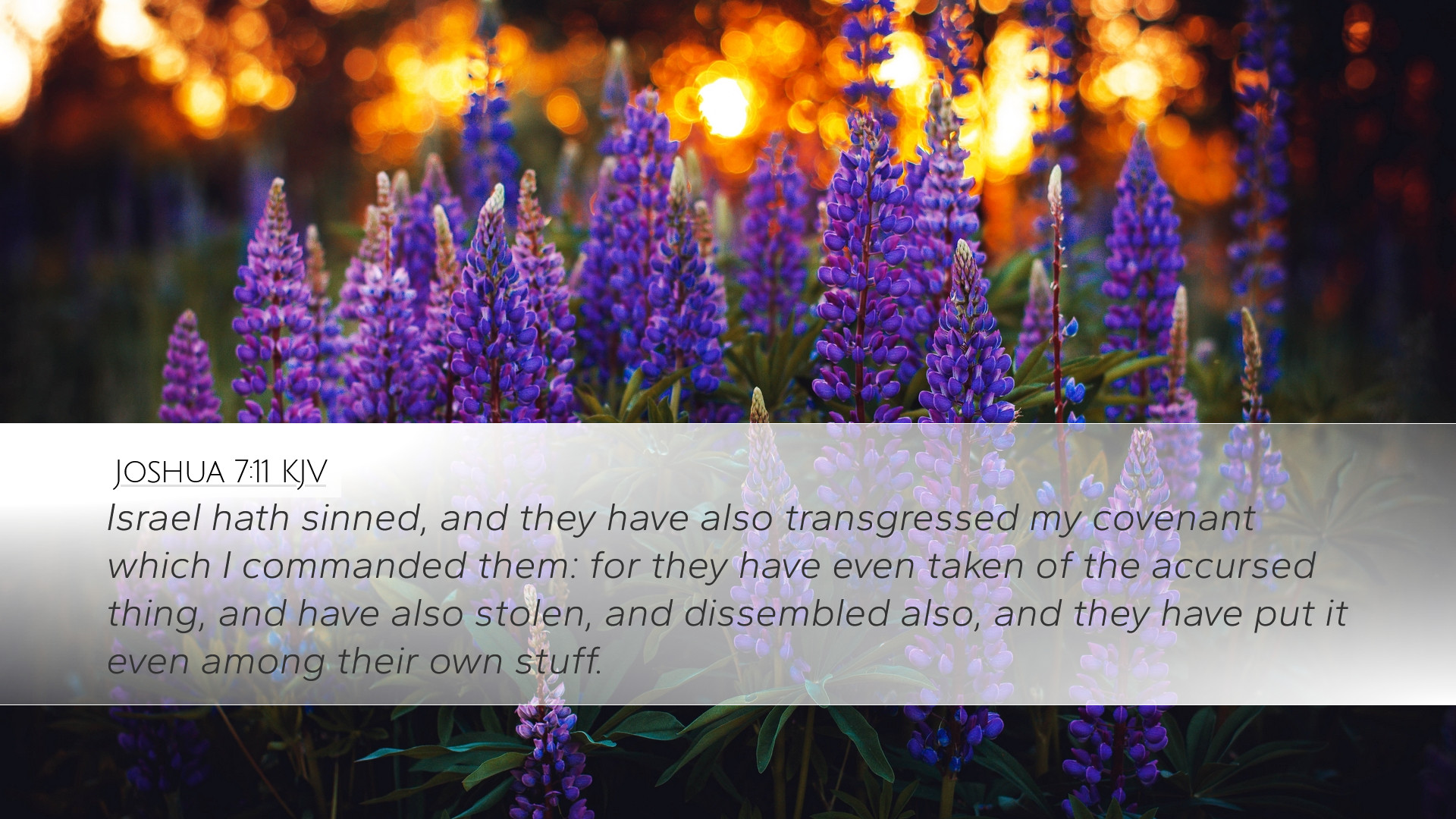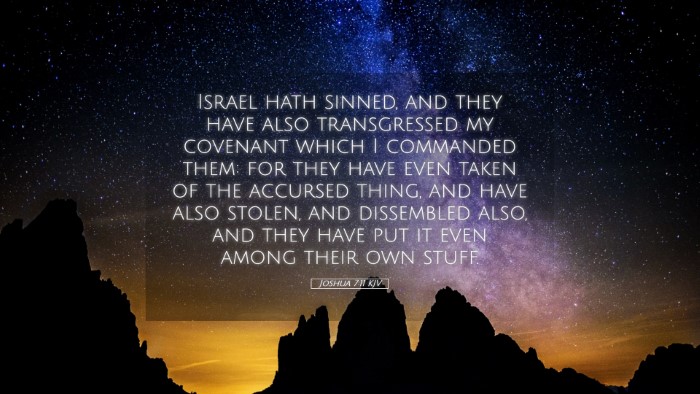Commentary on Joshua 7:11
Verse Context: Joshua 7:11 states, “Israel has sinned; they have transgressed My covenant which I commanded them. For they have taken some of the accursed things, and have both stolen and deceived; and they have put it among their own stuff.”
Introduction
This verse occurs in a pivotal moment following Israel’s defeat at Ai, highlighting both the direct consequences of disobedience to God and the profound implications of collective sin within the community of faith. The insights from various public domain commentaries shed light on the theological, moral, and practical components of this scripture.
Theological Insights
Divine Sovereignty and Human Responsibility
Matthew Henry explains that this passage exemplifies God's absolute sovereignty over Israel and their affairs. The sin of one individual, Achan, had devastating effects on the entire nation. He points out that while God is sovereign, the actions of individuals cannot be excused. Their collective nature teaches that the failure of one can lead to divine judgment on all.
Covenantal Relationship
Albert Barnes emphasizes the concept of covenant between God and Israel. The term “My covenant” refers to the foundational promises and obligations that God assured to His people. Their transgression indicates not merely a breach of law but a violation of relational trust. This perspective compels readers to reflect on the gravity of disobedience in the context of divine promises.
Consequences of Sin
Adam Clarke adds critical exegesis, noting the assertion that sin brings defilement. He indicates that Achan's act of taking the "accursed things" not only subjected him to death but brought shame and defeat upon Israel. Clarke stresses that sin does not only affect the sinner; it reverberates throughout the community, affecting future victories and blessings.
Moral and Practical Lessons
The Nature of Sin
Matthew Henry delves into the nature of sin as illustrated by Achan’s actions. He categorizes sin into theft, deception, and betrayal. The cumulative result presents a portrait of how one person’s choices can lead to the compromise of a group’s integrity. This serves as an admonition for believers today to consider the ramifications of their individual sins on the body of Christ.
Collective Responsibility
Albert Barnes challenges modern readers to contemplate the concept of corporate responsibility. He points out that in the body of believers, the failure of one can lead to the downfall of many. Churches and communities are urged to hold each other accountable and remain vigilant against sin, which can lead to collective vulnerability.
The Role of Confession and Restoration
Adam Clarke advocates for an understanding of repentance in light of this verse. He suggests that acknowledgment of sin is vital for restoration with God. Clarke asserts that the path to recovery from sin includes open confession, seeking forgiveness, and striving for holiness. This promotes the idea of communal healing following repentance.
Historical Context
Matthew Henry provides insight into the historical background surrounding Israel’s conquest of Canaan. The command to destroy all that was captured was aimed at preventing idolatry and immorality from corrupting Israel's exclusive devotion to Yahweh. Their failure to adhere to this command presents a dire warning of the allure of materialism that can draw believers away from their commitments to God.
Application for Modern Believers
Joshua 7:11 holds significant implications for contemporary faith communities. The verse serves as a reminder of the seriousness of sin and the consequences that may follow. It urges believers to foster integrity within their personal lives, understanding that individual choices possess the power to impact broader fellowship.
Personal Reflection
Pastors and leaders are encouraged to engage their congregations in discussions around personal righteousness and collective holiness. Though the narrative is set in a historical context, its principles are timeless and relevant, urging believers to evaluate the hidden sins in their lives and seek purity in their walk with God.
Community Vigilance
Churches are reminded of the importance of maintaining accountability and fostering a culture where sin can be addressed lovingly and constructively. The communal aspect of faith is integral, as indicated in this passage, reminding believers that they are part of something greater than themselves.
Conclusion
Joshua 7:11 encapsulates critical truths about sin, accountability, and the nature of God’s relationship with His people. The combined insights of Henry, Barnes, and Clarke challenge us to heed the warnings of Scripture, pursue holiness both individually and corporately, and approach God with hearts ready to repent and be restored. Thus, we are called to mutual care, vigilance, and an unwavering commitment to the covenant we hold with God.


